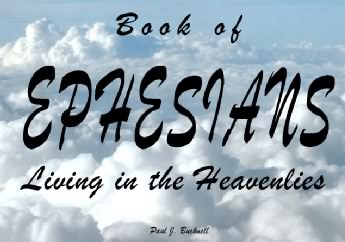
Four Special Descriptions of the Church
Ephesians 2:19-22
– The Bible Teacher's Commentary –
Paul J. Bucknell
_________________________
2:19 So then you are no longer strangers and aliens, but you are fellow citizens with the saints, and are of God’s household, 2:20 having been built upon the foundation of the apostles and prophets, Christ Jesus Himself being the corner stone, 2:21 in whom the whole building, being fitted together is growing into a holy temple in the Lord; 2:22 in whom you also are being built together into a dwelling of God in the Spirit. (Ephesians 2:19-22).
Bible Study Questions
Ephesians 2:19-22
Four Special Descriptions of the Church
The apostle is ecstatic at what has happened due to the great grace of God in Christ. In this short passage, he speaks of four special ways God’s people are uniquely blessed. We can look at the whole section comparing how things are different now that we, God’s people, are in Christ.
Bible Study Questions
- What is Paul referring to when he says, “So then you are no longer strangers and aliens? (Ephesians 2:19)” Refer to the former verses as needed.
- Paul will make a stark contrast between strangers and aliens with other descriptions throughout this study. But firstly, let us better understand what we are contrasting them with. Name at least four characteristics of strangers and aliens.
- The first description is “fellow citizens” (Ephesians 2:19). Who is he speaking to? What does this description mean? What does the added phrase ‘with the saints’ emphasize?
- How does this description differ from the description of strangers and aliens?
- The next description is regarding God’s household (Ephesians 2:19). What does it mean to be of God’s household? How does being of God’s family differ from the description of strangers and aliens?
- Explain how a person can become part of God’s family?
- The word ‘household’ has more of a family concept rather than building. Paul, however, uses a foundation to describe this household (Ephesians 2:20). What parts of the foundation does Paul mention? Why does he emphasize them?
- Explain what a cornerstone is. Check a Bible dictionary that describes how things were done in that day if one is unfamiliar. What does it then mean for Jesus to be the cornerstone?
- Paul slowly starts transitioning to the third description for God’s people in Ephesians 2:21. What is this description? How is this different from the prior one (God’s household or family)?
- Notice how Paul says the whole building … is growing (3:21). What is unusual about this? Why might Paul refer to a building in this way? (Note that ‘the whole building’ can also be translated every or each building).
- What does the word ‘whole’ refer to here? In this greater context why is this important? How can this concept help us better appreciate those that are different from us?
- At the end of verse 21, Paul starts using the fourth description. What is this? What is the difference between this and the former (whole building)?
- What does the phrase ‘fitted together’ refer to (2:21)? Who does the fitting? What is being fitted? What might this mean practically for our lives?
- The word for temple here refers specifically to the holy sanctuary where God dwelt. Read 1 Corinthians 3:16. We often think of each one of us as an individual temple. Examine the text closely here and see if this is the concept here. How has individualism of the West (and often exported elsewhere) hurt our lives and churches?
- How does this description differ from strangers and aliens?
- Although Ephesians 2:22 might be thought of as a fifth description, it seems better to use it to summarize the former verse by describing what Paul meant by a holy temple in the Lord. Remember that these Ephesians did not understand the holy temple in Jerusalem. What can we further understand of the holy temple by the words in 2:22?
- Notice how he points out that God lives in His people through the Holy Spirit. What is the Holy Spirit? Is the Holy Spirit an ‘it’ (like a power) or a person (see Ephesians 4:30)? Where has the Holy Spirit so far been mentioned in the Book of Ephesians?
- Let’s summarize what we have learned in this study. What are the four descriptions of God’s people in Ephesians 2:19-22? How does each differ from being a stranger and alien?
 Most of BFF articles such as this one is nicely formatted for printing. This article also has a Powerpoint. Check out the great number of articles on the BFF Biblical Training Library all at one low cost. Most of BFF articles such as this one is nicely formatted for printing. This article also has a Powerpoint. Check out the great number of articles on the BFF Biblical Training Library all at one low cost. |
Read more exciting and practical articles on the Book of Ephesians.
Introduction to the Book of EphesiansPaul's Second Missonary Journey to Ephesus - Map Ephesians 1Ephesians 1:1-3 Every Spiritual BlessingEphesians 1:1-3 Every Spiritual Blessing Ephesians 2-3Ephesians 2:1-3 Our Need, His graceEphesians 2:1-3, an Introduction | Podcast |
Ephesians 4Ephesians 4:1-3 Preserving the Spirit's UnityIntro: Problems of Disunity Ephesians 4:11-16 The Purpose of TrainingEphesians 4:11-13: A) God's Word in the Church Ephesians 4:14 B) Responsibility 1. Deceit Ephesians 4:11-14 Chart: Equipping of the Saints Ephesians 5-6Ephesians 5:22,24 Wives be Subject to your Husband |
info@foundationsforfreedom.net
Scriptures typically quoted from the New American Standard Bible unless noted:
(C) Copyright The Lockman Foundation 1988










